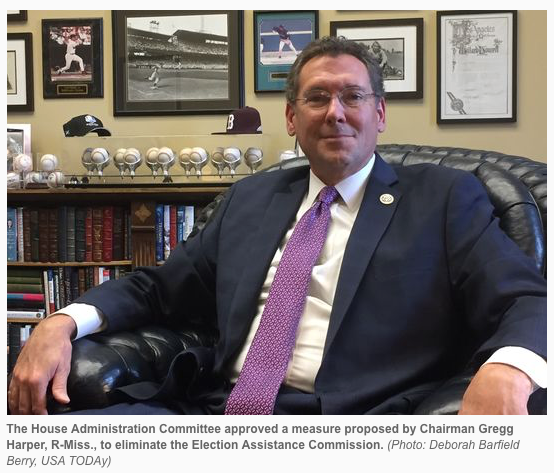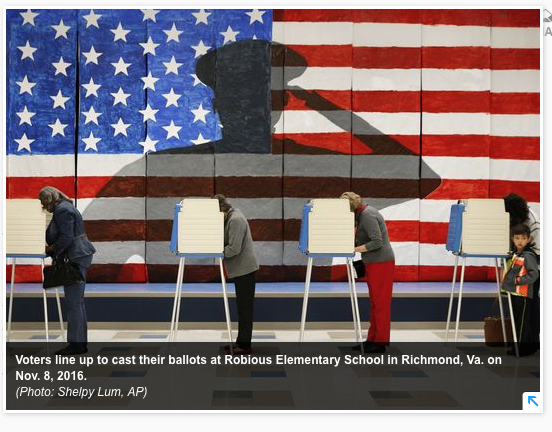Deborah Barfield Berry USA TODAY Feb. 7, 2017
WASHINGTON — While President Trump is promising to launch an investigation into his belief that millions of illegal ballots were cast in 2016, the Republican-led House Administration Committee voted Tuesday to shut down the federal agency set up to help states improve their election systems.
Rep. Gregg Harper, R-Miss., chairman of the House Administration Committee, said the Election Assistance Commission has “outlived” his usefulness.
“It is time for the EAC to be officially ended,” said Harper. “We don’t need fluff.”
The committee voted 6-3 to approve Harper’s measure. It is not clear yet when and if the House will consider the measure. Harper has introduced a bill four times to eliminate the agency. The House has passed the legislation only once, but the measure may stand a better chance this session in the Republican-controlled Congress.
The GOP’s renewed effort comes just after Trump vowed to launch a federal probe into his claims of massive voter fraud. It also comes in the wake of charges that Russian hackers tried to destabilize the U.S. election. Harper said the EAC wouldn’t have jurisdiction over those matters anyway.
Republicans have long argued the agency is no longer needed and was only meant to be a temporary agency to dole out $3.1 billion to states to improve election systems after the disputed 2000 presidential election. That money is gone. Democrats, however, argue the EAC is needed now more than ever.
Read more:
“This is the time when we should be focusing on strengthening” the EAC, said Pennsylvania Rep. Robert Brady, the top Democrat on the committee.
Brady argued the EAC helps states run fair, accurate and efficient elections. He said the agency provided key support to states in the last election.
The EAC is a bipartisan independent agency created as part of the 2002 Help America Vote Act. The agency’s mission was to help states improve their voting systems and distribute money to buy new equipment.
The agency, which operates with a $10 million annual budget, acts as a clearinghouse for information and also provides technical support to state election officials.
“If we get eliminated I think that’s a dire thing for the American people,” said Thomas Hicks, chairman of the EAC. “To eliminate the agency when we have another election coming up in two years would be throwing things into chaos.”
Harper’s bill would put some of the EAC functions under the Federal Election Commission. “Voting is such an important right and we want to make the voting process stronger,” Harper said. “The EAC has really not had a role.” 
Hicks said the agency could be key to helping develop guidelines for much-needed voting machine upgrades.
“We will function every day as if this is our last day and still go to help election officials,” he said. “So if we go for the next 10 years we’re going to still operate the same way. If we go for the next 10 minutes we’re going to operate the same way.”
Voting rights advocates urged committee members to reject Harper’s bill.
“At a time when the vast majority of our country’s voting machines are outdated and in need of replacement, and after an election in which international criminals already attempted to hack our state voter registration systems, eliminating the EAC would pose a risky and irresponsible threat to our election infrastructure,” the Brennan Center for Justice at New York University School of Law wrote in a letter to the House panel.
Lloyd Leonard, director of advocacy for the League of Women Voters, said he was disappointed with the committee vote.
“It’s really an attempt to sweep the problems under the rug,” said Leonard, noting worries such as long lines, potential Russian interference and outdated voting machines. “This legislation is poorly thought out and really won’t accomplish any positive purpose.”
But Harper said even state election officials don’t want the EAC. The National Association of Secretaries of State has repeatedly approved a resolution supporting the elimination of the EAC. It will likely be an issue at the group’s national conference in Washington next week.
Some members, however, including Louisiana Secretary of State Tom Schedler, the association’s immediate past president, have reversed their position and want to keep the EAC.
Still, Harper said the EAC has lived long past the three years it was supposed to exist. “It just keeps going and going,’’ he said.



You must be logged in to post a comment Login